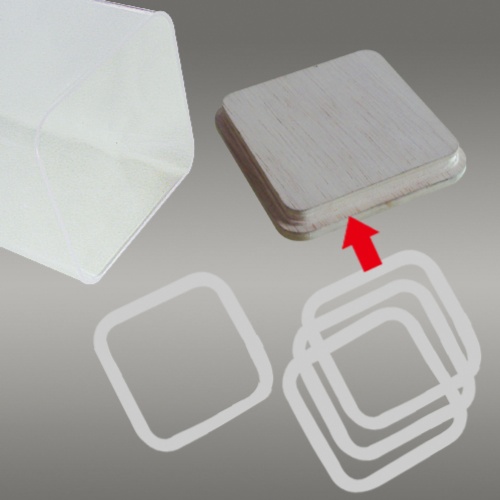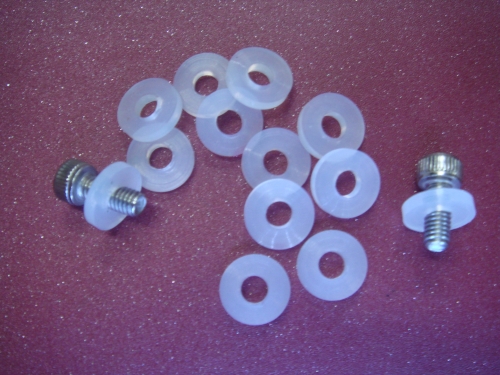矽膠射出
 矽膠射出
矽膠射出
矽膠射出(Silicone Injection Molding)是一種使用矽樹脂(Silicone)進行注射成型的製程方法。它是將矽樹脂加熱到液態狀態,然後通過注射機將其注入模具中,最終經過固化形成所需的產品或零件。
矽膠射出具有以下特點和優勢:
材料彈性和柔軟性:矽樹脂具有出色的彈性和柔軟性,能夠在變形和伸展的情況下保持其原有形狀和性能。這使得矽膠射出的產品適合應用於需要彈性和柔軟性的領域,如密封件、墊圈、按鍵等。
高準確性和細節度:矽膠射出具有高精度和細節度,能夠製造出複雜的形狀和精密的零件。這使得它適用於需要高度精確性和精密度的應用,如醫療器械、微型元件等。
耐熱性和耐候性:矽樹脂具有優異的耐熱性和耐候性,能夠在高溫和惡劣環境下保持穩定性和性能。這使得矽膠射出的產品適用於需要耐高溫和耐候性的應用,如汽車零件、電子元件等。
生物相容性:矽樹脂具有優良的生物相容性,無毒無害,與人體組織相容性良好。這使得矽膠射出在醫療器械和醫療產品的製造中得到廣泛應用,如人工心臟瓣膜、醫療注射器、乳膠製品等。
色彩和透明度:矽膠射出可以通過添加顏料或染料來實現多種色彩的製造,同時也可以製造出具有良好透明度的產品。這使得矽膠射出能夠滿足不同產品的色彩和外觀要求。
矽膠射出廣泛應用於許多不同的領域,包括醫療、汽車、電子、家居用品等。它能夠製造出高品質、高性能的產品,並且適應各種複雜的設計需求。
當然,以下是更多關於矽膠射出的資訊: 矽膠射出
矽膠射出
耐化學性:矽樹脂在矽膠射出過程中具有優異的耐化學性,能夠抵抗多種化學物質的侵蝕,包括酸、鹼、溶劑等。這使得矽膠射出的產品適用於需要耐腐蝕性的應用,如化學實驗室設備、化學封裝等。
高溫穩定性:矽樹脂具有出色的高溫穩定性,能夠在高溫環境下保持其物理和化學性質。這使得矽膠射出的產品適用於需要耐高溫性能的應用,如燈具、烘烤器具等。
電氣絕緣性:矽樹脂具有良好的電氣絕緣性能,可以有效阻隔電流傳導,同時具有良好的耐電壓性能。這使得矽膠射出適用於電子和電氣領域中需要絕緣材料的應用,如電纜接頭、絕緣蓋等。
低摩擦係數:矽膠射出的產品表面具有低摩擦係數,能夠減少摩擦損耗和能量損失。這使得矽膠射出適用於需要減少摩擦和磨損的應用,如軸承、密封件等。
彈性恢復性:矽膠射出的產品具有良好的彈性恢復性,能夠在壓縮或變形後迅速回復原狀。這使得矽膠射出適用於需要彈性恢復性的應用,如防震墊、彈簧等。
高透明度:矽膠射出可以製造出具有優秀透明度的產品,其透明度接近玻璃。這使得矽膠射出適用於需要透明或半透明材料的應用,如光學元件、觸摸屏覆蓋板等。
矽膠射出是一種多功能的製程方法,它能夠生產出具有優異性能和多樣化特性的產品。無論在哪個領域,矽膠射出都提供了許多應用的可能性。
矽膠射出(Silicone Injection Molding)是一種先進的製造方法,用於製造各種矽樹脂(Silicone)產品或零件。這個製程涉及將矽樹脂材料加熱至液態狀態,然後通過注射機將其注入特定形狀的模具中。一旦注入模具,矽樹脂在模具中冷卻和固化,最終形成所需的產品或零件。以下是一些關於矽膠射出的重要特點和應用:
形狀多樣性:矽膠射出能夠生產各種不同形狀和尺寸的產品,從簡單的密封圈到複雜的機械零件都可以製造。
高精度:這個製程允許實現高精度的製品,包括微細細節和複雜的幾何形狀,這在某些應用中非常重要。
表面光滑度:矽膠射出製造的產品通常具有卓越的表面光滑度,無需額外的表面處理。
耐高溫性:矽樹脂本身就具有優越的耐高溫性能,因此適用於高溫應用,如汽車引擎零件或燈具。
耐化學性:矽膠射出的產品對多種化學品、溶劑和油具有耐腐蝕性,不易受到侵蝕。
耐候性:它具有優良的耐候性,可以在各種氣象條件下保持其性能,不易受到日光和氧化的影響。
生物相容性:某些矽樹脂材料是生物相容的,因此適用於醫療器械和醫療產品。
應用領域包括但不限於:
醫療器械:如醫療密封圈、假體、導管、手術工具等。
汽車工業:用於汽車零部件的製造,如汽車密封、電子模塊、引擎部件等。
電子產品:用於電子設備的絕緣、按鈕、密封件等。
工業機械:如密封圈、振動器、防護套管等。
消費品:如嬰兒產品、食品接觸件、噴霧器、按摩器等。
總之,矽膠射出是一項高效且多功能的製造技術,適用於各種應用領域,尤其適用於需要高精度、高品質和多樣形狀的產品製造。無論是在醫療、汽車、電子還是其他行業,它都提供了可靠的解決方案。
當談到矽膠射出(Silicone Injection Molding)時,還有一些其他重要的信息和考慮事項:
材料選擇:矽樹脂材料有多種類型,包括高溫硅樹脂(High-Temperature Silicone)和食品級硅樹脂(Food-Grade Silicone)等。選擇適合特定應用的矽樹脂材料非常重要,因為它們具有不同的特性和性能。
模具設計:模具的設計對於矽膠射出製程至關重要。優秀的模具設計可以確保高品質的製品和生產效率。考慮到矽膠的特性,模具需要具有一定的冷卻系統,以確保均勻的冷卻和固化。
表面處理:雖然矽膠射出的產品通常具有平滑的表面,但某些應用可能需要額外的表面處理,如絲印、鍍金、烤漆等,以達到特定的外觀或功能。
成本考慮:矽膠射出的模具和設備成本相對較高,因此通常適合於大批量生產,以分散這些固定成本。
環境友好性:一些矽樹脂材料是可回收的,這有助於減少環境影響。此外,矽樹脂通常不會釋放有害氣體或物質,符合環保標準。
長期性能:矽膠製品通常具有良好的耐候性和長期性能,但仍需要定期檢查和保養,以確保其性能不受影響。
總之,矽膠射出是一項高級的製造技術,廣泛應用於多個行業,以生產各種高品質的矽膠產品。它的特點包括高精度、多樣性、優越的耐高溫性和化學穩定性,使其成為解決複雜應用需求的理想選擇。根據特定應用的需求和成本考慮,可以選擇不同類型的矽樹脂和模具設計。
當談到矽膠射出(Silicone Injection Molding)時,還有一些其他重要的方面和應用值得考慮:
醫療級矽膠:在醫療器械和醫療產品的製造中,通常要使用符合醫療標準的醫療級矽膠材料,以確保產品的生物相容性和安全性。
食品接觸應用:對於與食品接觸的應用,如食品包裝、矽膠奶嘴等,需要使用食品級矽膠,以確保材料不會對食品安全造成危害。
耐化學性:某些矽膠材料具有卓越的耐化學性,適用於受到化學品或溶劑影響的應用。
溫度範圍:根據應用的需要,可以選擇不同耐溫性能的矽膠材料,包括低溫和高溫應用。
設計靈活性:矽膠射出製程允許在設計中實現複雜的幾何形狀,這為產品設計師提供了靈活性和創造性。
衛生和清潔:由於矽膠的平滑表面和抗菌性,這些產品相對容易清潔,這對於醫療和食品應用非常重要。
耐候性:矽膠產品通常具有優越的耐候性,可以在各種氣象條件下保持性能。
競爭優勢:矽膠射出通常適用於需要高品質、高精度和高性能的產品,這可以為企業帶來競爭優勢。
總之,矽膠射出是一種多功能的製造方法,適用於多種應用領域,包括醫療、食品、電子、汽車、工業等。其獨特的材料特性和製程能力使其成為製造高品質、高精度、複雜形狀產品的理想選擇。根據特定應用的需求,可以選擇不同類型的矽膠材料,以確保產品滿足性能和安全性要求。
silicone injection
silicone injection
Silicone Injection Molding is a process method that uses silicone resin for injection molding. It heats the silicone resin to a liquid state, then injects it into the mold through an injection machine, and finally solidifies to form the desired product or part.
Silicone injection has the following characteristics and advantages:
Material elasticity and softness: Silicone has excellent elasticity and softness, able to maintain its original shape and performance despite deformation and stretching. This makes silicone injection products suitable for applications that require elasticity and softness, such as seals, gaskets, buttons, etc.
High Accuracy and Detail: Silicone injection has a high level of accuracy and detail, enabling complex shapes and precision parts to be manufactured. This makes it suitable for applications that require a high degree of accuracy and precision, such as medical devices, micro components, etc.
Heat resistance and weather resistance: Silicone resin has excellent heat resistance and weather resistance, and can maintain stability and performance under high temperatures and harsh environments. This makes silicone injection products suitable for applications that require high temperature resistance and weather resistance, such as automotive parts, electronic components, etc.
Biocompatibility: Silicone resin has excellent biocompatibility, is non-toxic and harmless, and has good compatibility with human tissues. This makes silicone injection widely used in the manufacturing of medical devices and medical products, such as artificial heart valves, medical syringes, latex products, etc.
Color and transparency: Silicone injection can produce a variety of colors by adding pigments or dyes, and can also produce products with good transparency. This enables silicone injection to meet the color and appearance requirements of different products.
Silicone injection is widely used in many different fields, including medical, automotive, electronics, household products, and more. It can produce high-quality, high-performance products and adapt to a variety of complex design needs.
Of course, here’s more about silicone injection: Silicone Injection
Chemical resistance: Silicone resin has excellent chemical resistance during the silicone injection process and can resist erosion by a variety of chemical substances, including acids, alkalis, solvents, etc. This makes silicone injected products suitable for applications requiring corrosion resistance, such as chemical laboratory equipment, chemical packaging, etc.
High temperature stability: Silicone resin has excellent high temperature stability and can maintain its physical and chemical properties in high temperature environments. This makes silicone injection products suitable for applications requiring high temperature resistance, such as lamps, baking utensils, etc.
Electrical insulation: Silicone resin has good electrical insulation properties, can effectively block current conduction, and has good voltage resistance. This makes silicone injection suitable for applications in the electronics and electrical fields that require insulating materials, such as cable joints, insulating covers, etc.
Low friction coefficient: The surface of silicone injected products has a low friction coefficient, which can reduce friction loss and energy loss. This makes silicone injection suitable for applications where friction and wear need to be reduced, such as bearings, seals, etc.
Elastic recovery: Silicone injected products have good elastic recovery and can quickly return to their original shape after compression or deformation. This makes silicone injection suitable for applications that require elastic recovery, such as anti-vibration pads, springs, etc.
High transparency: Silicone injection can produce products with excellent transparency, whose transparency is close to that of glass. This makes silicone injection suitable for applications requiring transparent or translucent materials, such as optical components, touch screen overlays, etc.
Silicone injection is a versatile process method that can produce products with excellent performance and diverse properties. Regardless of the field, silicone injection offers many application possibilities.
Silicone Injection Molding is an advanced manufacturing method used to manufacture various silicone products or parts. The process involves heating the silicone material to a liquid state and then injecting it into a specifically shaped mold through an injection machine. Once injected into the mold, the silicone cools and solidifies in the mold, ultimately forming the desired product or part. Here are some important features and applications of silicone injection:
Shape diversity: Silicone injection can produce products of various shapes and sizes, from simple sealing rings to complex mechanical parts.
High precision: This process allows for high-precision parts, including fine details and complex geometries, which are important in certain applications.
Surface Smoothness: Products manufactured by silicone injection generally have excellent surface smoothness and require no additional surface treatment.
High temperature resistance: Silicone resin itself has superior high temperature resistance, so it is suitable for high temperature applications, such as automotive engine parts or lamps.
Chemical Resistance: Silicone injected products are resistant to a wide range of chemicals, solvents and oils, making them less susceptible to erosion.
Weather resistance: It has excellent weather resistance, can maintain its performance under various weather conditions, and is not easily affected by sunlight and oxidation.
Biocompatibility: Certain silicone materials are biocompatible and therefore suitable for use in medical devices and medical products.
Application areas include but are not limited to:
Medical devices: such as medical seals, prostheses, catheters, surgical tools, etc.
Automotive industry: used in the manufacturing of automotive parts, such as automotive seals, electronic modules, engine parts, etc.
Electronic products: insulation, buttons, seals, etc. used in electronic equipment.
Industrial machinery: such as sealing rings, vibrators, protective sleeves, etc.
Consumer products: such as baby products, food contact parts, sprayers, massagers, etc.
In short, silicone injection is an efficient and versatile manufacturing technology suitable for various application fields, especially for product manufacturing that requires high precision, high quality and diverse shapes. Whether in medical, automotive, electronics or other industries, it provides reliable solutions.
When it comes to silicone injection molding (Silicone Injection Molding), there are some other important information and considerations:
Material selection: There are many types of silicone materials, including High-Temperature Silicone and Food-Grade Silicone. It is important to choose the right silicone material for a specific application because they have different characteristics and performance.
Mold design: Mold design is crucial to the silicone injection process. Excellent mold design can ensure high-quality products and production efficiency. Considering the characteristics of silicone, the mold needs to have a certain cooling system to ensure uniform cooling and solidification.
Surface treatment: Although silicone injection products usually have a smooth surface, some applications may require additional surface treatment, such as silk screen printing, gold plating, baking paint, etc., to achieve a specific appearance or functionality.
Cost considerations: The cost of molds and equipment for silicone injection is relatively high, so it is usually suitable for high-volume production to spread these fixed costs.
Environmental friendliness: Some silicone materials are recyclable, which helps reduce environmental impact. In addition, silicone resin generally does not release harmful gases or substances and complies with environmental standards.
Long-term performance: Silicone products generally have good weather resistance and long-term performance, but they still require regular inspection and maintenance to ensure that their performance is not affected.
In summary, silicone injection is an advanced manufacturing technology that is widely used in multiple industries to produce a variety of high-quality silicone products. Its features include high precision, versatility, superior high temperature resistance and chemical stability, making it ideal for solving complex application needs. Different types of silicones and mold designs are available depending on the needs and cost considerations of the specific application.
When it comes to silicone injection molding, there are some other important aspects and applications worth considering:
Medical-grade silicone: In the manufacturing of medical devices and medical products, medical-grade silicone materials that meet medical standards are usually used to ensure the biocompatibility and safety of the product.
Food contact applications: For applications that come into contact with food, such as food packaging, silicone pacifiers, etc., food-grade silicone is required to ensure that the material does not pose a hazard to food safety.
Chemical Resistance: Some silicone materials offer excellent chemical resistance, making them suitable for applications affected by chemicals or solvents.
Temperature range: According to the needs of the application, silicone materials with different temperature resistance properties can be selected, including low-temperature and high-temperature applications.
Design flexibility: The silicone injection process allows complex geometries to be implemented in designs, which provides product designers with flexibility and creativity.
Hygiene and Cleaning: Due to silicone's smooth surface and antimicrobial properties, these products are relatively easy to clean, which is important for medical and food applications.
Weatherability: Silicone products generally have superior weather resistance and can maintain performance in a variety of weather conditions.
Competitive advantage: Silicone injection is generally suitable for products that require high quality, precision and performance, which can give companies a competitive advantage.
In summary, silicone injection is a versatile manufacturing method suitable for a variety of applications, including medical, food, electronics, automotive, industrial, and more. Its unique material properties and process capabilities make it an ideal choice for manufacturing high-quality, high-precision, complex-shaped products. Depending on the needs of a specific application, different types of silicone materials can be selected to ensure the product meets performance and safety requirements.